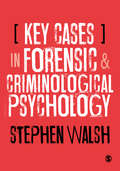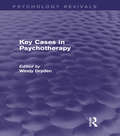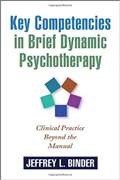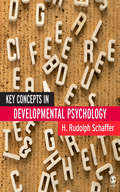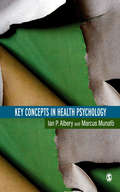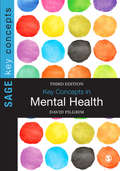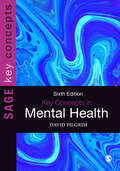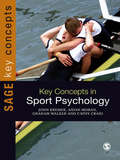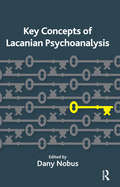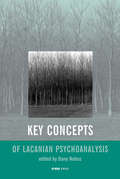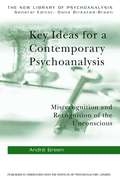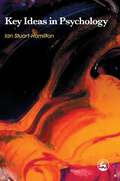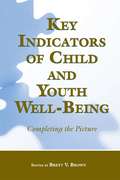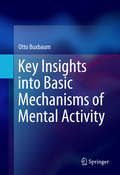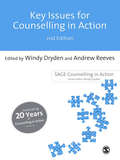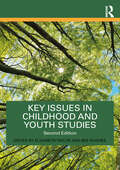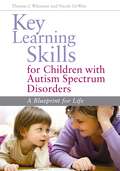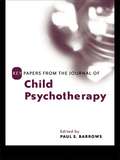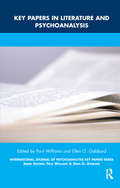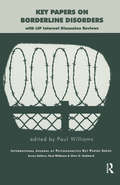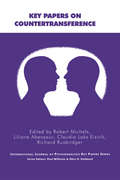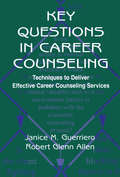- Table View
- List View
Key Cases in Forensic and Criminological Psychology
by R. Stephen WalshBy presenting current psychological theories alongside individual case studies, this book will guide you to understand the theory as it applies to specific instances of each crime. Covering a wide range of cases, from economic crimes, to terrorism and sexual and violent crimes, this book provides a comprehensive and engaging resource to develop an understanding of forensic psychology.
Key Cases in Forensic and Criminological Psychology
by R. Stephen WalshBy presenting current psychological theories alongside individual case studies, this book will guide you to understand the theory as it applies to specific instances of each crime. Covering a wide range of cases, from economic crimes, to terrorism and sexual and violent crimes, this book provides a comprehensive and engaging resource to develop an understanding of forensic psychology.
Key Cases in Psychotherapy (Psychology Revivals)
by Windy DrydenOriginally published in 1987, the purpose of this book was to show how therapists grappled with cases which challenged their ideas about the theory and practice of psychotherapy at the time, and how they revised these ideas as a result of encountering these cases. The contributors, leading therapists from Britain and the United States, discuss a range of issues – personal, conceptual and technical – that will be of interest to all those engaged in psychotherapeutic work. As such, the book is aimed at those working in psychotherapy counselling, clinical psychology and psychiatry, and at students of these disciplines. It will also have relevance for those with a scholarly interest in developments in the theory and practice of psychotherapy.
Key Competencies In Brief Dynamic Psychotherapy: Clinical Practice Beyond The Manual
by Jeffrey L. BinderThis book identifies the core competencies shared by expert therapists and helps clinicians—especially those providing brief dynamic/interpersonal therapy—to develop and apply them in their own work. Rather than being a cookbook of particular techniques, the book richly describes therapists' mental processes and moment-to-moment actions as they engage in effective therapeutic inquiry and improvise to help patients achieve their goals. The author integrates the psychotherapy and cognitive science literatures to provide a unique understanding of therapist expertise. Featuring many illustrative examples, the book offers fresh insights into how learning and interpersonal skills can be enhanced for both therapist and client.
Key Concepts in Developmental Psychology
by H. Rudolph SchafferPerfect for courses in child development or developmental psychology and arranged thematically in sections corresponding to chapter headings usually found in textbooks, this book is ideal for students wanting an accessible book to enrich their learning experience. Key Features: - Provides an overview of the place of each concept in Developmental Psychology under three headings, namely its meaning, origins and current usage. - Concepts are grouped into sections corresponding to the main themes usually covered in teaching. - Relevant concepts in the book are emboldened and linked by listing at the end of each concept - Guidance is provided to further reading on each of the concepts discussed. The book will be centrally important to undergraduate students who need to learn the language used by developmental psychologists in describing their studies, but will also help more advanced readers in checking their ideas regarding the nature and uSAGE of particular concepts.
Key Concepts in Health Psychology
by Dr Ian Albery Dr Marcus MunafoWhile current textbooks in health psychology offer the reader some conceptual reasoning about different aspects of the discipline, there is no one source which provides an accessible, navigable and cross-referenced analysis of the major models and ideas in health psychology. Key Concepts in Health Psychology provides a `one stop' analysis of key issues, theories, models and methods in contemporary health psychology. It enables the reader to engage with a full range of approaches and methods in the field, and importantly to be able to appreciate the relationships between these.
Key Concepts in Mental Health
by David Pilgrim"This book wins on two levels: not only is there an extensive range of concepts presented (including some that are unexpected yet clearly relevant), there is also a succinct, thorough and critical dissection of each. Recommended, if not essential, reading for all student mental health professionals. " - Dr Steven Pryjmachuk, Head of Mental Health Division, School of Nursing, Midwifery and Social Work, University of Manchester Mental health is an area that new students and trainee practitioners often find bewildering. This book cuts through the stigma associated with this topic. It delivers bite-sized chunks of information that cover the central concepts and debates which shape contemporary views about mental health and illness. As this book shows, these key concepts not only influence our understanding of mental health, but also govern the provision of services for people with mental-health problems. Drawing together perspectives from sociology, psychiatry, psychology and ethics, the vital topics in mental health are examined in three parts: - PART ONE: Mental Health and Mental-Health Problems explores theories and understandings of mental health and illness - PART TWO: Mental Health Services looks at the structure and organization of mental health service delivery, past and present - PART THREE: Mental Health and Society studies the social context. This new edition adds 10 new concepts as well as updating the previous entries. New topics include childhood adversity, recovery, spirituality, well-being, social and cultural capital, quality of mental-health services, evidence-based practice, and work and mental health. This book will be invaluable for trainee health professionals, including clinical psychologists, social workers, nurses, counsellors and psychotherapists.
Key Concepts in Mental Health
by David PilgrimThis is the only text to give you a complete, concise overview of mental health and all the issues that surround it from a theoretical and practical point of view. Split into three sections, the book defines mental health and mental illness, examines the services and settings in which mental health care takes place and discusses the societal issues surrounding mental health. Made up of 63 bite-sized chapters, the book offers: · Definitions of the key concepts · Key points that you need to know for your study and practice · Further reading to help you expand your knowledge It will be essential reading for students of health, nursing, mental health, social work and social care. It is also valuable reading for students of counselling and psychotherapy.
Key Concepts in Mental Health (SAGE Key Concepts series)
by David PilgrimA classic and long-trusted resource that provides short summaries of all the key theories, concepts and terminology associated with mental health. Each entry is neatly summarised and thoroughly referenced giving the reader an immediate and thorough entry point to the subject. Structured into four sections, the text starts with entries related to Mental Health and Mental Abnormality, before moving onto Mental Health Services and Society. The new edition offers: 70 concise chapters including new entries on social networks and loneliness Updates across all chapters to align with contemporary, critical debates in mental health Appropriate consideration of the intersection of Covid-19 and mental health An essential guide for students of mental health studies, health, nursing, social work, education, psychology, counselling and psychotherapy.
Key Concepts in Mental Health (SAGE Key Concepts series)
by David PilgrimA classic and long-trusted resource that provides short summaries of all the key theories, concepts and terminology associated with mental health. Each entry is neatly summarised and thoroughly referenced giving the reader an immediate and thorough entry point to the subject. Structured into four sections, the text starts with entries related to Mental Health and Mental Abnormality, before moving onto Mental Health Services and Society. The new edition offers: 70 concise chapters including new entries on social networks and loneliness Updates across all chapters to align with contemporary, critical debates in mental health Appropriate consideration of the intersection of Covid-19 and mental health An essential guide for students of mental health studies, health, nursing, social work, education, psychology, counselling and psychotherapy.
Key Concepts in Sport Psychology (SAGE Key Concepts series)
by Graham Walker Aidan Moran Dr John M Kremer Cathy CraigThis book provides a focused, accurate guide for students working within the dynamic field of sport psychology. The concise and authoritative entries have been selected by experienced teachers and researchers; each one defines, explains and develops a key topic in sport psychology acting as a springboard for further reading and debate. This is a stimulating and practical resource for students defined by the clarity of writing and relevant examples. Each concept gives the student: * clear definitions * up-to-date suggestions for further reading * careful cross-referencing Easy to use and intelligently judged this book offers the modern student the basic materials, tools and guidance for planning essays and passing exams.
Key Concepts of Lacanian Psychoanalysis
by Dany NobusIn this classic work, eight crucial Lacanian ideas are explained through detailed exploration of the theoretical and/or practical context in which Lacan introduced them, the way in which they developed throughout his works, and the questions they were designed to answer. The book does not presuppose any familiarity with Lacanian theory on the part of the reader, nor a prior acquaintance with Lacan's Ecrits or seminars. Originally published in 1998, the ideas within are more relevant than ever and this newly reissued volume will prove invaluable to today's scholars of Lacanian thought.
Key Concepts of Lacanian Psychoanalysis
by Dany Nobus"By detailing the constitutive incompletion of the Lacanian project, the contributors have guaranteed the success of their book, which will remain a major reference for a long time to come."-Joan Copjec
Key Ideas for a Contemporary Psychoanalysis: Misrecognition and Recognition of the Unconscious (The New Library of Psychoanalysis)
by Andre GreenAndré Green attempts the complex task of identifying and examining the key ideas for a contemporary psychoanalytic practice. This undertaking is motivated both by the need for an outline of the evolution of psychoanalysis since Freud's death, and by the hope of tackling the fragmentation which has led to the current 'crisis of psychoanalysis'. In three sections covering the theoretical and practical aspects of psychoanalysis, and analysing the current state of the field, André Green provides a stimulating overview of the principal concepts that have guided his work. Subjects covered include: Transference and countertransference Psychoanalysis and Psychotherapy: modalities and results Language-speech-discourse in psychoanalysis Recognition of the unconscious This unique contemporary perspective on the psychoanalytic enterprise will fascinate all those with an interest in the problems that face the field and the opportunities for its future development.
Key Ideas in Psychology
by Ian Stuart-HamiltonThis accessible book has a simple aim - to tell people what psychology is about. It presents a review of the key areas of the subject as it is traditionally taught, and provides the reader with an introduction to important concepts and findings within each of these. Armed with the information in this book, the reader should be able at least to make sense of most psychological topics. At the end of each chapter is a set of suggested further readings which will enable a more detailed exploration of the particular topic under discussion to be made. The book will be of interest to two groups of readers. The first comprises people who are new to the subject and simply want to know what psychology is. The second consists of those who want a general guide to an area but who wish to make up their minds on the details for themselves. Hence the basic information and arguments are explained, but details are not elaborated.
Key Indicators of Child and Youth Well-Being: Completing the Picture
by Brett V. BrownIndicators of child and youth well-being are indispensable tools for improving the lives of children. In this book, the nation‘s leading development researchers review the recent progress made in the measurement, collection, dissemination, and use of indicators of child and youth well-being. In addition, they identify opportunities for future
Key Insights into Basic Mechanisms of Mental Activity
by Otto BuxbaumA more nuanced perspective on cognition, behavior,personality, and pathology. Mind/brain. It is explained that mental activity is not possible withoutconcepts/memory structures that exist in the brain and result from perceptuallearning. Core mental activities including thinking, reasoning, and judgmentare described as components of self-regulation and in terms of interactingneural systems. This framework also leads to a more specific and lessstigmatizing system for classifying and diagnosing mental illnesses. This concise volume: Introduces the S-O-R (stimulus-organism-response) model of mental activity. Recasts mental processes as neuro-mental processes. Provides empirical evidence for the neural basis for judgments. Addresses ongoing mind/brain questions such as whether thinking is unconscious. Key Insights into Basic of Mental Activity will interest scientists doingresearch in psychology, psychiatry, psychotherapy, human biology/anthropology,linguistics, and neuroscience. Professors, lecturers, and instructors will findit important as a class text in these fields. And the book's clinicalimplications make it useful to practitioners of psychology, psychiatry, andpsychotherapy.
Key Issues for Counselling in Action (Counselling in Action)
by Windy Dryden Dr Andrew ReevesSAGE celebrated the 20th Anniversary of the Counselling in Action in November 2008. To view the video - click here ------------------------------------------------------ Effective counselling is based on a strong working relationship between counsellor and client. Building and maintaining this therapeutic alliance, demands both skill and an ability to negotiate challenges which arise during the counselling process. Key Issues for Counselling in Action prepares new practitioners for face-to-face work with clients by looking at what is required at each stage of the process and examining issues which practitioners most frequently need to deal with along the way. The topics covered are relevant to all counsellors, regardless of theoretical orientation. The book explores the everyday issues counsellors face when: - getting started - making an assessment - working at relational depth - setting goals, and - ending the relationship Advice is also given on more difficult challenges, such as dealing with: - reluctant clients - stuckness - client dependency, and - unplanned endings. Key Issues for Counselling in Action is a bestselling text which has been used to train many thousands of counsellors as well as supporting their continuing professional development. This second edition has been completely re-written and includes new material on the use of touch, self-care, culture and counselling evaluation. Windy Dryden is Professor of Psychotherapeutic Studies, Professional and Community Education (PACE) at Goldsmiths College, University of London. Andrew Reeves is a University Counsellor at the University of Liverpool Counselling Service and Editor of the journal, Counselling & Psychotherapy Research.
Key Issues in Childhood and Youth Studies
by Elizabeth TaylorThis fully revised and expanded second edition of Key Issues in Childhood and Youth Studies presents an informed and critical commentary on a range of key issues related to children and childhood, from birth to eighteen years.Challenging current orthodoxies within the adult world on the nature of childhood, it is an essential text for students of childhood and youth studies as well as those studying relevant professional qualifications in social work, teaching and health. Exploring ideas from the historical development of childhood to the demonising of youth, it is divided into five clearly defined sections, each with their own editorial introduction which highlights the key themes: Creating Childhood, The Developing Child, Children at Risk, The Politics of Childhood, Bordered Childhood and International Perspectives.Containing 15 newly written chapters and three revised pieces, this invaluable textbook provides an overview of childhood and youth studies and encourages students to think about the issues discussed and to develop their own ideas. Each chapter contains student activities, key concept boxes, recommended further reading and a reflection exercise.
Key Learning Skills for Children with Autism Spectrum Disorders
by Thomas L. Whitman Nicole Dewittxx
Key Papers from the Journal of Child Psychotherapy
by Paul S. BarrowsThe practice of child psychotherapy builds upon the writings and contributions of earlier writers, such that it is not only the latest research and theory that are valuable. Key Papers from the Journal of Child Psychotherapy provides access to classic and important papers from the early years of the Journal - papers that have previously been difficult to obtain. The papers are grouped thematically to cover the entire range of work represented in the journal: theoretical, clinical, applied. The papers, written by professionals at the forefront of their fields, cover areas including psychoanalytical metapsychology, work with deprived children, work with trauma, and how psychoanalytic thinking can be applied in the context of institutions for children. Chapters include:: : Anne Alvarez's Problems in the Use of the Countertransference : : Edna O'Shaughnessy's The Absent Object : : Gianna Henry's Doubly DeprivedKey Papers from the Journal of Child Psychotherapy presents in one accessible volume, essential papers for all those training and practising in child psychotherapy. It will be of great benefit to all professionals involved in direct work with children.
Key Papers in Literature and Psychoanalysis (The IJPA Key Papers Series)
by Paul Williams Glen O. GabbardThis book presents several essays from the International Journal of Psychoanalysis that explore overlaps of literary experience and psychoanalytic process, providing the reader with a substantive contribution that reflects the principal concerns of contemporary psychoanalysis.
Key Papers on Borderline Disorders: With IJP Internet Discussion Reviews (The IJPA Key Papers Series)
by Paul WilliamsThe International Journal of Psychoanalysis Key Papers Series brings together the most important psychoanalytic papers in the journal's eighty-year history in a series of accessible monographs. Approaching the IJP's intellectual resources from a variety of perspectives, the monographs highlight important domains of psychoanalytic enquiry.
Key Papers on Countertransference: IJP Education Section (The IJPA Key Papers Series)
by Paul Williams Glen O. Gabbard Liliane Abensour Richard Rusbridger Robert Michels Claudio Laks EizirikThe International Journal of Psychoanalysis Key Papers Series brings together the most important psychoanalytic papers in the journal's eighty-year history in a series of accessible monographs. Approaching the IJP's intellectual rsources from a variety of perspectives, the monographs highlight important domains of psychoanalytic enquirry. 'The papers in this volume were commissioned with a view to describing the current views of countertransference, and thier historical evolution, in four intellectual communities of psychoanalysis: North America, Britain, France and Latin America. 'Psychoanalysis is still sometimes described as a monolithic and unchanging theory and practice. These papers vividly contradict such a view through their close study of the evolution of the concept of countertransference from the periphery of psychoanalysis to its current position of central importance in most analytic communities. In doing so, they provide a window of the development of a living and evolving discipline during its first one hundred years.'- From the Introduction by Richard Rusbridger
Key Questions in Career Counseling: Techniques To Deliver Effective Career Counseling Services
by Robert G. Allen Janice M. GuerrieroThis book's purpose is to provide a tool for career services personnel to deliver more effective, consistent career counseling. Its primary objective is to present a career counseling process model, including sequential stages and steps, along with a method (the Key Questions Technique) for successfully implementing the model. It is intended to serve as the bridge between the theoretical and the applied worlds of career counseling, and it is hoped that this book will increase the standards of professionalism and objectivity for the many diverse practitioners who currently conduct career counseling in the workplace.
